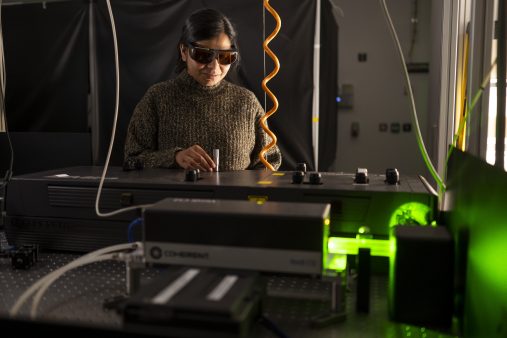Build it and they will stay? Making physics stick in south Wales
10 March 2023
The Institute of Physics (IOP) has been looking at the role of physics in the Welsh economy. After a recent visit to Cardiff University, the IOP’s former policy manager in Wales, Richard Duffy, discusses the solutions the Innovation Campus might presage.

“The stats are sometimes tweaked, but the story remains the same for Wales. Decades of low R&D levels, the lowest research spending per head of the UK nations and regions of England, and a consistent slot at or near the bottom of productivity tables.
The arguments are equally well-rehearsed. Insufficient share of UK-wide funding streams, lack of underpinning infrastructure and skills, ‘missing middle’ of Welsh-owned and -headquartered firms. You can now add the removal of significant EU funding streams, which served as a bulwark against the trio above.
Our own surveys show Welsh physics innovators having to postpone or outsource innovation activities because of a skills shortage, as well as a greater reliance on soon-to-vanish EU funding than counterparts in other parts of the UK.
Regional support
If you have continued reading beyond the dispiriting (well done, hypothetical ‘you’), you can now have something more positive.
The IOP visited Cardiff University recently to meet with Professor Peter Smowton, head of physics and lead for the organisation’s work on compound semiconductors. While we covered many of the challenges outlined above—as well as the serious issues with a lack of physics skills and teachers in Wales—we were able to see what the University is doing.
The Institute of Compound Semiconductors is one of several key roles the University is playing in the wider compound semiconductor cluster—csConnected. The Institute’s cleanroom is a link between academia and industry, with fabrication facilities specifically designed to match industrial conditions. Bridging the ever-mentioned ‘valley of death’ and doing so at pace.

A dedicated MSc and EPSRC Centre for Doctoral Training provides the necessary pipeline of skills for the cluster, while another EPSRC-funded project—the Compound Semiconductor Future Manufacturing Hub—serves the need to make sure that the UK industry is not over reliant on design innovation. A nod to a diverse sector ahead of the forthcoming UK semiconductor strategy.
Perhaps the most important discussion covered the desire to have such projects work to make higher education R&D, skills and consequent spinouts ‘stick’ in south Wales. Our missing middle is only going to be plugged when we generate enough companies that grow in Wales and embed themselves at the point of maturity.
No more ‘screwdriver outfits’ that arrive and depart in less than a generation, but robust and viable companies with an active physics R&D base.
Physics-adjacent
So, yes. Physics, physics, physics. Stick, sticky, sticky.
But what gives the facility an extra advantage is its neighbour, sbarc | spark. Some of the challenges affecting physics are either wider societal issues or adjacent to the subject itself. A shortage of teachers, stereotypes about subjects, a need to increase technical education provision.
So, while you can see the cutting-edge, industry-relevant physics happening in one building, you can visit the other to discuss how we might pick up on some of those issues.

Questions about how Wales’s education reforms might affect science? Well, WISERD is next door. Concerned about the direction of research and innovation policy? You can hop over there and speak to CIPR. Looking to take your compound semiconductor research to market? There’s an incubator the other side of the courtyard.
The point is that the facilities cohere in a way that makes them both relevant to Welsh needs and to Welsh challenges. This could have been a routine hot-desk job, giving space to the highest spender.
But it’s different. It’s the physics department meeting the needs of the local industry, rather than a generic effort to be commercially relevant. It’s social scientists sharing space with those working on policy delivery in Wales, sharing expertise and findings that work in our devolved context. And it means C. P. Snow’s ‘two cultures’ problem looks a little less difficult on sunny Maindy Road.
And my sandwich was nice, too.”
Richard Duffy
For more information about the IoP’s work in Wales, contact physics@iopwales.org